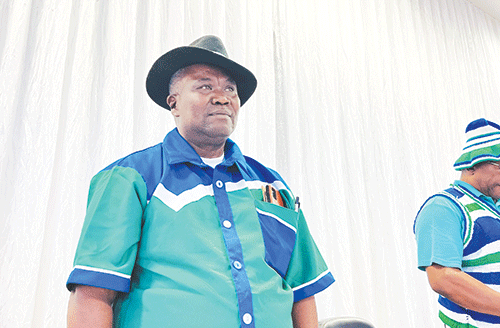SWAKOPMUND – Kunene Regional Council chairperson Hendrik Gaobaeb emerged victorious over the weekend, securing the presidency of the UDF at the party’s elective congress in Swakopmund.
Gaobaeb is currently the Sesfontein constituency councillor.
This marks a significant political shift for the United Democratic Front (UDF).
Gaobaeb’s triumph, with a commanding 127 votes, signals a departure from the leadership of now former president Apius !Auchab, who garnered 77 votes, and vice president Dudu Murorua, who received 54 votes.
!Auchab and Murorua have been at the helm of the party since the previous elective congress in 2013.
In a notable shake-up within UDF, the party’s acting youth league secretary general, Michael Skini, experienced a setback as he lost the vice president position to Nico Somaeb.
Another significant development unfolded in the contest for the position of secretary general, where former Arandis local authority councillor Daniel Tsaneb emerged victorious with a substantial 150 votes, defeating Hage Gawaseb who could only secure 50 votes.
Tsaneb’s deputy will be Karibib mayor Davey van Wyk.
It is still not clear how this development will affect the current positions in Parliament and regional offices following the elections.
The gender dynamic within the party’s top structure sees Seriane Mukuta holding the position of national treasurer, standing as the sole woman in the leadership lineup.
Additional key appointments include Flora Guruses as deputy treasurer, Mabasen /Narib as the information and publicity officer, and Moritz Geingob as national organiser.
Not a dying horse
Political analyst Rui Tyitende, who was party to some of the proceedings over the weekend, said that UDF is not a dying horse. According to him, the party has a constituency rooted in the fabric of ethnicity, and it is up to the new leadership to strengthen the party.
“The commotion that unfolded at the congress is indicative of a party that is not familiar with the intricacies and processes of conducting a congress. They were experimenting with a pivotal exercise in which political parties, and the election of their leadership have become the major organising principle of modern politics. Notwithstanding these challenges, the party managed to elect its leaders,” he said.
More importantly, he said, the outcome of the congress was a vote of no confidence in the leadership of !Auchab for failing to present a presidential and financial report on the activities of the party since 2013.
“Interestingly, more female members [were present] but more male members were contesting the various top positions. UDF should be intentional about opening the space for women who are capable of competing for leadership positions,” the analyst noted.
Tyitende also pointed out that the most important aspect of this congress was the conspicuous absence of policy positions or ideas that articulate the new and more diverse aspirations that have emerged in Namibia, especially the deteriorating socioeconomic conditions.
“What is UDF’s policy stance or agenda on solving the myriad of challenges engulfing the country? Is there another congress that will address this matter? If yes, their legal framework in terms of the constitution should be accessible to journalists and analysts to understand their internal processes and avoid unnecessary confusion and questions,” he said.
Also commenting on the issue, political analyst Ndumba Kamwanyah said the turmoil surrounding the congress clearly showed that the party is experiencing a leadership crisis.
“I am not sure the newly elected leadership has the tenacity, intellect, and the wisdom to revitalise the party,” he said yesterday.
Meanwhile, spokesperson of the party Mabasen /Narib yesterday described the congress as a resounding success despite the challenges experienced during the process.
“The elections were transparent, and we are happy with the outcome,” he said.
/Narib said the incoming leadership faces a formidable task in restoring faith and trust among party members as well as positioning the UDF rightfully within Namibian politics. While elective congresses are a beacon of democracy, they can also breed disunity within the party’s ranks, he said.
He further said the newly elected president also issued a clarion call for unity, emphasising the need to rally behind leadership rather than allowing divisions based on delegate preferences.
Way forward
/Narib indicated that consultations are underway regarding the party’s two parliamentary seats as well as addressing concerns raised during the congress.
“The former treasurer will present financial reports, and a non-elective congress will convene to discuss party growth and other pertinent matters. A policy conference platform will also be established to address various party policies, fostering smooth operational processes. Our president also underscored that business as usual is not an option; transparency and accountability must govern the party. Moving forward, decisions will be made with people’s input, reflecting the new leadership’s unwavering commitment to core democratic values,” /Narib said.
– edeklerk@nepc.com.na


